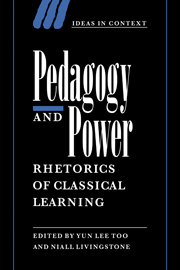Book contents
- Frontmatter
- Contents
- Notes on contributors
- Acknowledgements
- Introduction
- 1 Classics: from discipline in crisis to (multi-)cultural capital
- 2 Schoolboys and gentlemen: classical pedagogy and authority in the English public school
- 3 ‘Die Zung’ ist dieses Schwert': classical tongues and gendered curricula in German schooling to 1908
- 4 ‘What does that argue for us?’: the politics of teaching and political education in late eighteenth-century dialogues
- 5 Women and classical education in the early modern period
- 6 Pilgrimage to Parnassus: local intellectual traditions, humanist education and the cultural geography of sixteenth-century England
- 7 ‘Not so much praise as precept’: Erasmus, panegyric, and the Renaissance art of teaching princes
- 8 Teachers, pupils and imperial power in eleventh-century Byzantium
- 9 Reading power in Roman Greece: the paideia of Dio Chrysostom
- 10 Children, animals, slaves and grammar
- 11 A good man skilled in politics: Quintilian's political theory
- 12 The voice of Isocrates and the dissemination of cultural power
- 13 Xenophon's Cyropaedia: disfiguring the pedagogical state
- Select bibliography
- Index
- IDEAS IN CONTEXT
2 - Schoolboys and gentlemen: classical pedagogy and authority in the English public school
Published online by Cambridge University Press: 30 September 2009
- Frontmatter
- Contents
- Notes on contributors
- Acknowledgements
- Introduction
- 1 Classics: from discipline in crisis to (multi-)cultural capital
- 2 Schoolboys and gentlemen: classical pedagogy and authority in the English public school
- 3 ‘Die Zung’ ist dieses Schwert': classical tongues and gendered curricula in German schooling to 1908
- 4 ‘What does that argue for us?’: the politics of teaching and political education in late eighteenth-century dialogues
- 5 Women and classical education in the early modern period
- 6 Pilgrimage to Parnassus: local intellectual traditions, humanist education and the cultural geography of sixteenth-century England
- 7 ‘Not so much praise as precept’: Erasmus, panegyric, and the Renaissance art of teaching princes
- 8 Teachers, pupils and imperial power in eleventh-century Byzantium
- 9 Reading power in Roman Greece: the paideia of Dio Chrysostom
- 10 Children, animals, slaves and grammar
- 11 A good man skilled in politics: Quintilian's political theory
- 12 The voice of Isocrates and the dissemination of cultural power
- 13 Xenophon's Cyropaedia: disfiguring the pedagogical state
- Select bibliography
- Index
- IDEAS IN CONTEXT
Summary
By the end of the nineteenth century, the authority of classical education had been severely eroded. New areas of knowledge had invaded an enlarged curriculum in the ancient universities (though much less so in the public schools). A mature industrial economy faced increasing competition from rivals abroad; the franchise was being extended to the working classes and would soon also incorporate women. These challenges to the authority of classics and its bearers prompted a rearticulation of ideas of classical knowledge and pedagogy in which the symbolic centre of classics moved from ‘culture’ to ‘discipline’. The compulsory Greek requirement at Oxford and Cambridge, symbol both of the dominance of Hellenism during the Victorian era and of the universities' autonomy from the state, was repeatedly attacked, and finally was abolished in 1919–20. In turn, the study of Latin, previously subordinated to Greek, came to be seen as an exemplary disciplinary subject within the widened academic curriculum. In essence, it symbolised the internalised self-control of the new voter, a bulwark against ochlocracy.
In learning grammar by rote in the lower forms of public schools, boys (as they almost all were) were learning both to learn and to obey: the two faces of disciplina. The same could be said of the ‘nonsense verses’ with which many boys began their encounter with verse composition: metrically accurate, but not expected to make any sense.
- Type
- Chapter
- Information
- Pedagogy and PowerRhetorics of Classical Learning, pp. 29 - 46Publisher: Cambridge University PressPrint publication year: 1998
- 1
- Cited by



